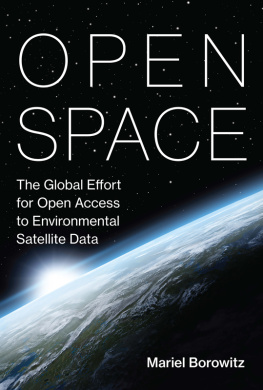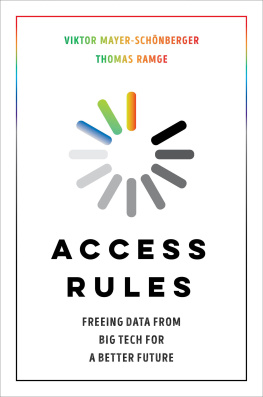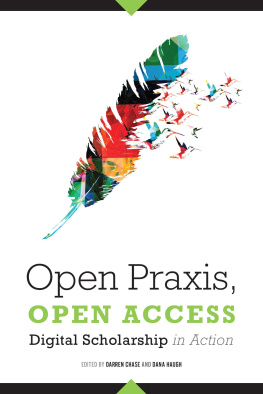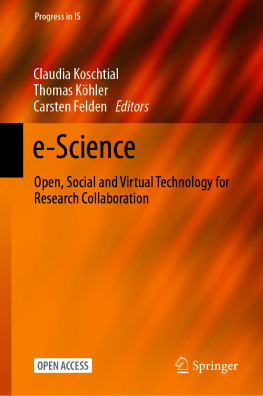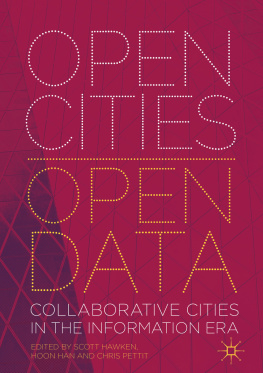Mariel Borowitz - Open Space: The Global Effort for Open Access to Environmental Satellite Data
Here you can read online Mariel Borowitz - Open Space: The Global Effort for Open Access to Environmental Satellite Data full text of the book (entire story) in english for free. Download pdf and epub, get meaning, cover and reviews about this ebook. year: 2018, publisher: MIT Press, genre: Politics. Description of the work, (preface) as well as reviews are available. Best literature library LitArk.com created for fans of good reading and offers a wide selection of genres:
Romance novel
Science fiction
Adventure
Detective
Science
History
Home and family
Prose
Art
Politics
Computer
Non-fiction
Religion
Business
Children
Humor
Choose a favorite category and find really read worthwhile books. Enjoy immersion in the world of imagination, feel the emotions of the characters or learn something new for yourself, make an fascinating discovery.
- Book:Open Space: The Global Effort for Open Access to Environmental Satellite Data
- Author:
- Publisher:MIT Press
- Genre:
- Year:2018
- Rating:3 / 5
- Favourites:Add to favourites
- Your mark:
- 60
- 1
- 2
- 3
- 4
- 5
Open Space: The Global Effort for Open Access to Environmental Satellite Data: summary, description and annotation
We offer to read an annotation, description, summary or preface (depends on what the author of the book "Open Space: The Global Effort for Open Access to Environmental Satellite Data" wrote himself). If you haven't found the necessary information about the book — write in the comments, we will try to find it.
Mariel Borowitz: author's other books
Who wrote Open Space: The Global Effort for Open Access to Environmental Satellite Data? Find out the surname, the name of the author of the book and a list of all author's works by series.
Open Space: The Global Effort for Open Access to Environmental Satellite Data — read online for free the complete book (whole text) full work
Below is the text of the book, divided by pages. System saving the place of the last page read, allows you to conveniently read the book "Open Space: The Global Effort for Open Access to Environmental Satellite Data" online for free, without having to search again every time where you left off. Put a bookmark, and you can go to the page where you finished reading at any time.
Font size:
Interval:
Bookmark:
Information Policy Series
Edited by Sandra Braman
The Information Policy Series publishes research on and analysis of significant problems in the field of information policy, including decisions and practices that enable or constrain information, communication, and culture irrespective of the legal silos in which they have traditionally been located as well as state-lawsociety interactions. Defining information policy as all laws, regulations, and decision-making principles that affect any form of information creation, processing, flows, and use, the series includes attention to the formal decisions, decision-making processes, and entities of government; the formal and informal decisions, decision-making processes, and entities of private and public sector agents capable of constitutive effects on the nature of society; and the cultural habits and predispositions of governmentality that support and sustain government and governance. The parametric functions of information policy at the boundaries of social, informational, and technological systems are of global importance because they provide the context for all communications, interactions, and social processes.
Virtual Economies: Design and Analysis, Vili Lehdonvirta and Edward Castronova
Traversing Digital Babel: Information, E-Government, and Exchange, Alon Peled
Chasing the Tape: Information Law and Policy in Capital Markets, Onnig H. Dombalagian
Regulating the Cloud: Policy for Computing Infrastructure, edited by Christopher S. Yoo and Jean-Franois Blanchette
Privacy on the Ground: Driving Corporate Behavior in the United States and Europe, Kenneth A. Bamberger and Deirdre K. Mulligan
How Not to Network a Nation: The Uneasy History of the Soviet Internet, Benjamin Peters
Hate Spin: The Manufacture of Religious Offense and Its Threat to Democracy, Cherian George
Big Data Is Not a Monolith, edited by Cassidy R. Sugimoto, Hamid R. Ekbia, and Michael Mattioli
Decoding the Social World: Data Science and the Unintended Consequences of Communication, Sandra Gonzlez-Bailn
Open Space: The Global Effort for Open Access to Environmental Satellite Data, Mariel John Borowitz
Mariel John Borowitz
The MIT Press
Cambridge, Massachusetts
London, England
2017 Massachusetts Institute of Technology
All rights reserved. No part of this book may be reproduced in any form by any electronic or mechanical means (including photocopying, recording, or information storage and retrieval) without permission in writing from the publisher.
This book was set in ITC Stone Sans Std and ITC Stone Serif Std by Toppan Best-set Premedia Limited. Printed and bound in the United States of America.
Library of Congress Cataloging-in-Publication Data
Names: Borowitz, Mariel.
Title: Open space : the global effort for open access to environmental satellite data / Mariel Borowitz.
Description: Cambridge, MA : The MIT Press, [2018] | Series: Information policy | Includes bibliographical references and index.
Identifiers: LCCN 2017019414 | ISBN 9780262037181 (hardcover : alk. paper)
eISBN 9780262343800
Subjects: LCSH: Astronautics in earth sciences. | Environmental monitoringRemote sensing. | Climatic changesRemote sensing. | Communication policy. | Information resources management.
Classification: LCC QE33.2.R4 B677 2018 | DDC 550.28/4dc23 LC record available at https://lccn.loc.gov/2017019414
ePub Version 1.0
d_r0
To family, especially my husband, Jeff, who also provided endless support and a bottomless cup of coffee.
Sandra Braman
The story is complex. We tend to think of openness as an on/off conditionbut often, as Mariel Borowitz's comprehensive analysis of access to satellite data from around the world finds, the most successful way to maximize usage of very large datasets is to blend diverse types of access. The industrial economy has given way to an information economybut as Borowitz's history of efforts to commercialize satellite data shows, that doesn't mean that every attempt to make a market in information will succeed. There is wide agreement on the importance of making publicly available data that will help communities recuperate from problems such as those raised by the environmental crisisbut as we learn from Open Space, short-term or spot sharing won't do the trick. In a lot of systems, data become available only when users specifically request it based on particular needsbut a great many of the most valuable uses of data develop only after the information is freely available.
With all of today's talk about and experimentation with open access to data, to publications, and to decision-making procedures, it will be a surprise to most of us to learn that one of the earliest references to open data as a policy issue showed up in debate over what to do with data gathered by satellites. Indeed, Mariel Borowitz's in-depth analysis of meteorological and space agencies in the United States, Europe, and Japan found that they all began operations assuming they would provide open access. The fact that a mix of approaches is currently in use, both for those satellite-sensing systems presented in full case studies and in the rest of the 35 countries that conducted remote sensing by the beginning of 2016 that are all analyzed in Open Space, is evidence of just how difficult it is to achieve effective and meaningful access to data for all who desire it, in a manner in which they can use it.
A variety of factors figure in. There is an interplay between expectations, reputations, innovation, economics, and the uses to which data are put. Implications of developments are not always obvious and a change in any one factor can affect the relative weighting and relationships among the rest. The trend toward storing ever-larger satellite datasets in clouds provides an example. The US government chose to move its satellite data to private sector clouds because doing so was more cost-effective and efficient than trying to developing its own cloud-based storage. It might seem that such a move would inevitably shift costs to users who then must access the data through a private sector provider, but Borowitz points out that that isn't sowhatever funds a government entity had been devoting to storage and access on its own servers could be used in an arrangement with companies to ensure that user access and use of data is free.
Borowitz's research was inspired by the problem of how to get access to satellite data that is of such value to environmentalists. By its conclusion, though, this clear and insightful analysis, informed by theories and research from multiple disciplines, provides a model for understanding the complexities of open access to data of any type, and from any source. Open Space concludes with real golda range of realistic, feasible policy recommendations for data access that maximizes access and openness for countries, situations, and data of different types. These, too, can be used as models for access to data from sources other than satellites.
Unusually, and usefully, in her conclusions Borowitz notes things that users as well as data providers and the governments standing behind them whether through intimate or arm's-length relationships can do. We can make sure to always attribute sources of data, a practice that runs counter to the big data trend of ignoring or losing provenance altogether in an important and necessary way. We can analyze and publicize the value of data that are openly accessible. We can be consistent in our reputational treatment of those who do and do not make their data available for use by environmentalists and others concerned about social issues of such importance to us all. And, whether or not particular leaders and communities have turned their backs on facts as the basis of their decision-making, we can demand the data, and use them.
Next pageFont size:
Interval:
Bookmark:
Similar books «Open Space: The Global Effort for Open Access to Environmental Satellite Data»
Look at similar books to Open Space: The Global Effort for Open Access to Environmental Satellite Data. We have selected literature similar in name and meaning in the hope of providing readers with more options to find new, interesting, not yet read works.
Discussion, reviews of the book Open Space: The Global Effort for Open Access to Environmental Satellite Data and just readers' own opinions. Leave your comments, write what you think about the work, its meaning or the main characters. Specify what exactly you liked and what you didn't like, and why you think so.

